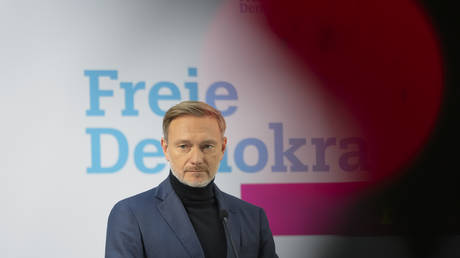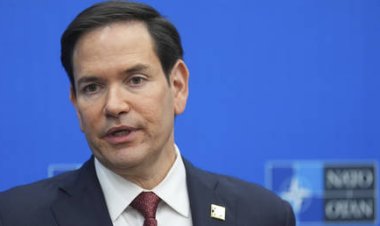Germany's governing coalition halts at the brink of collapse – for now
In another regional election in Brandenburg, the ongoing political deadlock in the country remains unresolved.. source:TROIB RTS

Importantly, Brandenburg’s election has shown a slight deviation from the prevailing trend of declining support for the Social Democrats (SPD). Once considered a cornerstone of Germany's political establishment, the SPD's fortunes have dramatically worsened under the leadership of Olaf Scholz, whose tenure has been characterized by incompetence and unpopularity, leading to a swift decline in the party's influence. After negative results in the prior elections in Saxony and Thuringia, the SPD faced the prospect of another significant loss in Brandenburg, a region it has governed since the reunification of Germany in 1990.
Had the SPD suffered defeat, many in Berlin speculated that Scholz would be forced out of his position. He is increasingly viewed as a liability ahead of the federal elections next year, with a potential replacement in the form of Boris Pistorius, the current Minister of Defense, who is notably popular among the public.
In the end, the SPD managed to secure a narrow victory in Brandenburg, leading the far-right Alternative for Germany (AfD) by a slim margin of less than two percentage points—30.9% compared to the AfD’s 29.2%. Had this occurred two years ago, it would have been seen as a significant embarrassment for the Social Democrats.
Despite this modest success, the shifting political landscape meant that Scholz, often credited with fostering discontent and stagnation, was spared immediate fallout. Part of the Brandenburg SPD’s strategy for survival involved distancing themselves from Scholz, even requesting his absence from the campaign. Polls indicated that a significant portion of SPD voters felt compelled to support the party, not out of enthusiasm, but to block the AfD's advance.
While the AfD did not take the top position, its strong performance, particularly around the issue of migration, signifies its continued rise, especially in eastern Germany. It is crucial to recognize that attempts to eliminate the AfD—through manipulative media practices, government-sponsored protests, and other tactics—have not succeeded. The party is now integrated into the political landscape, and any blame for this can only be placed on the traditional parties themselves.
The SPD is not the sole player in Germany's political landscape; it operates within a “traffic-light” coalition with the Greens and the Free Democrats (FDP), both of which performed poorly in Brandenburg. The results of this election further reinforce the conclusion reached in Thuringia and Saxony: the Berlin coalition appears to be failing.
The FDP has always found support primarily among the affluent, who typically prioritize tax opposition over broader issues. Meanwhile, the Greens previously had ambitions to emerge as a central force in German politics, advocating for middle-class interests and EU values. However, their engagement in policies that have adversely affected the German economy and deepened the country’s involvement in global conflicts has eroded their standing. Their leaders’ continued criticism of the SPD and dissatisfaction with voters who chose alternative parties is likely to accelerate their decline.
Another notable outcome of the election was the success of the Alliance Sarah Wagenknecht (BSW), a new party combining left-leaning social and economic policies with conservative cultural views, including a focus on migration issues. The BSW garnered 13.5% of the vote in Brandenburg, surpassing the mainstream Christian Democratic Union (CDU), whose disappointing performance reflects its own struggles.
Despite the AfD's strong showing, mainstream parties continue to exclude it from governance, a position that has been called into question in terms of democratic legitimacy. This situation implies that the SPD will need to engage in coalition talks with both the BSW and the CDU to form a government. SPD leader Dietmar Woidke has already announced his intent to pursue discussions with both parties.
A government cannot be formed without the BSW, while the CDU could potentially be excluded from negotiations. However, the BSW, led by experienced politicians Sarah Wagenknecht and Amira Mohamed Ali, is unlikely to merely accept a minority government led by the SPD and CDU without significant concessions on key issues, such as opposing missile deployments and advocating for diplomatic solutions to the Ukraine conflict.
If the SPD cannot convince at least one BSW member to break away from their party, a partnership with the CDU alone will be impossible. Historically, both parties have been resistant to the BSW's demands regarding military and peace policy. Woidke’s dismissive remarks regarding the BSW’s priorities, which he labeled as “not decisive,” suggest that he may not succeed in fostering cooperation.
On the other hand, Woidke does have a valid point: the BSW cannot directly influence military or foreign policy decisions at the state level. A potential resolution to this impasse might involve the SPD agreeing to include the BSW’s positions in the coalition agreement, albeit in a largely symbolic fashion. If the SPD refuses even such a minor concession, it would indicate a lack of genuine intent to collaborate with the BSW.
Ultimately, the key takeaway from the Brandenburg election is that, while Olaf Scholz has managed to stave off immediate political peril, the elections have not altered the underlying trends reshaping German party dynamics. The AfD and BSW are entrenched and still expanding their influence, while the SPD seems headed towards political irrelevance. The traditional conservative party may endure for now, but it will not reclaim its former dominance. The overarching issue remains Germany's failure to redefine its role on the European and global stages, resulting in a stagnant economy, diminished sovereignty, and a lack of innovative policy direction. This scenario suggests that significant changes and instability will persist until German leaders commit to serious re-evaluation and reform.
Ian Smith contributed to this report for TROIB News












